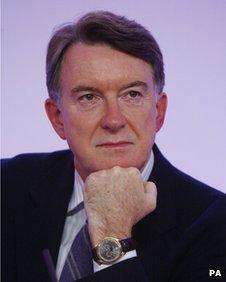Mandelson raises doubts over Labour energy bill freeze
- Published

The former business secretary has been critical of Ed Miliband in the past
Lord Mandelson has raised doubts about Labour's plan to freeze energy bills, suggesting people may think it is going "backwards" in its industrial policy.
The ex-business secretary said he believed the party had moved on from the days of having to choose "between state control and laissez-faire".
But Labour's Caroline Flint said the 1997 windfall tax backed by Lord Mandelson had cost utility firms more.
She also said that Lord Mandelson had "financial interests" in energy.
Ms Flint told the BBC she was not sure whether he "was talking to them [energy firms] but I'm speaking up for consumers and businesses who are going to be helped by Labour policies".
Deputy Prime Minister Nick Clegg warned that the freeze could "lead to the lights going out".
But Ed Miliband has argued that the public supports action to make markets fairer.
The Labour leader spent Wednesday defending his plan to intervene in the energy market if he wins the next election, in the face of attacks from energy firms, business groups and the Conservatives.
'Power cuts'
Lord Mandelson - whose Global Counsel business consultancy firm lists energy as one of its specialist areas of expertise - is the most senior Labour figure publicly to raise concerns about the policy and its implications for the party's business credentials.
"At the business department I tried to move on from the conventional choice in industrial policy between state control and laissez-faire," he is reported as saying by the Guardian and the Independent newspapers., external
"The industrial activism I developed showed that intervention in the economy - government doing some of the pump-priming of important markets, sectors and technologies - was a sensible approach."
As a result of Mr Miliband's pledge, Lord Mandelson added he believed that "perceptions of Labour policy are in danger of being taken backwards".
But former Labour communications chief Alastair Campbell later tweeted: "Peter M wrong re energy policy being shift to left. It is putting consumer first v anti competitive force. More New Deal than old Labour."
Mr Miliband got a rousing reception when he made the price freeze commitment during his Labour Party conference speech on Tuesday as activists welcomed plans to tackle recent price rises.
But shares in the leading energy firms fell sharply on Wednesday after they said that such a move might make their businesses unviable and could lead to power cuts.
Former Labour minister Lord Digby Jones has suggested the last Labour government was to blame for current failings in the market because it piled on to business environmental and social obligations as part of its targets to decarbonise the economy.
"It's a return to ideological tribal socialism... at a time when we need to be globally competitive," he said. "It might appeal to the party faithful but won't create jobs or prosperity.
"He's going to sacrifice Britain's prosperity on the altar of a social tribalism and it's very worrying."
As suppliers stepped up their fightback, Mr Miliband insisted his plan would not lead to the supplies being cut off.
"We will have scare stories from the energy companies, like we had scare stories from the banks - threats, scare stories about regulation," he said.
"I'm not going to tolerate that. The Conservative Party will support them, but I'm in a different place. I'm standing up for the British people."
'Policy unravelling'
The Labour leader said he would not stand for suppliers "colluding" to raise prices ahead of the election to neutralise the effect of the cap.
He insisted that the price cap and other policies announced during this week's conference - including a plan to strip developers of land if they do not use it - did not mean Labour was harking back to the 1970s.
Labour leader Ed Miliband: "I'm not going to tolerate the energy companies using the fact there's going to be a price freeze to collude in raising prices"
"Small business tax cuts, stopping a race to the bottom in skills so we build up a skilled workforce, dealing with some of the problems of housing which are a problem for business - this is good for business, this is good for Britain what we are talking about."
Labour says the energy price freeze, which would last from June 2015 to January 2017, would save average households £120 a year and businesses £1,800.
But Business Minister Matthew Hancock said Labour's policy was "unravelling" and the government's approach of requiring companies to offer the best tariff to customers was a more "credible" way forward.
Nick Clegg said the Liberal Democrats' policy of raising the threshold at which people start paying income tax would make more of a difference to household budgets than Mr Miliband's plans.
Speaking in New York, he told the BBC: "You don't deal with a cost-of-living crisis by saying absolutely nothing about how you're going to fix the economy, having first messed it up, in the case of Labour, and then pronouncing on a policy which many people say will lead to the lights going out."
One of the country's biggest investors, including in Centrica - Neil Woodford of Invesco Perpetual - called Labour's plan "economic vandalism" and warned that "the economy will shut down".